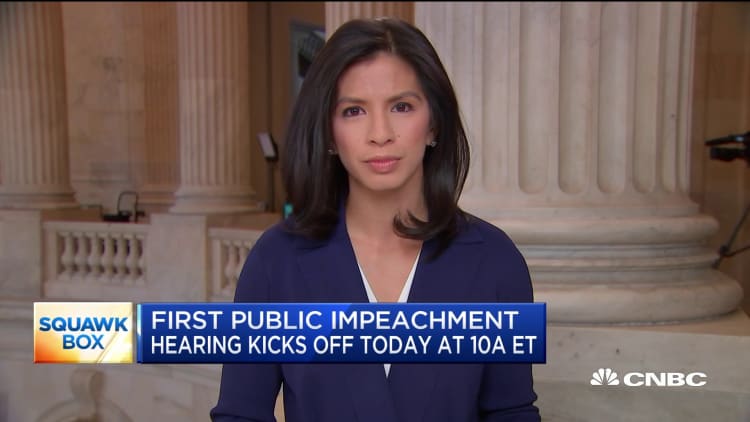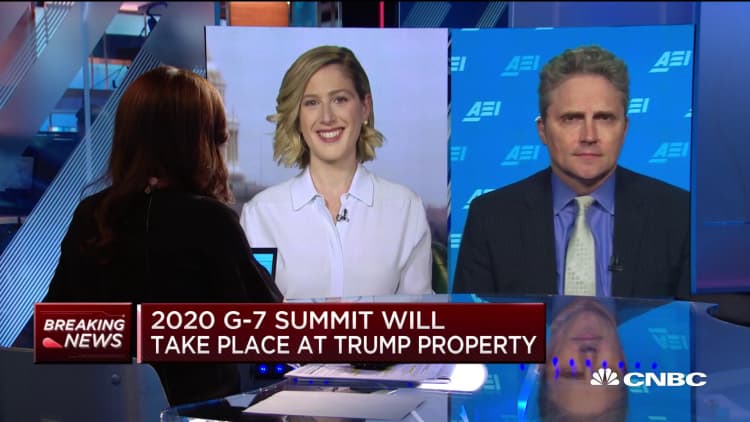
WASHINGTON – The second phase of the impeachment inquiry into President Donald Trump begins this week. Now, under the glare of TV cameras, House Democrats will face the first real test of whether they can mount a straightforward case that convinces a majority of Americans that Trump deserves to be formally impeached.
For Republicans, this new phase of public hearings offers them a chance to portray the entire impeachment inquiry as illegitimate and overtly partisan, simply another opportunity for Democrats to attack Trump ahead of the 2020 presidential election.
As the hearings get underway, the country is deeply divided as to whether impeachment is the right choice. According to the latest NBC/Wall Street Journal poll, released Nov. 3, 49% of Americans believe Trump should be impeached and removed from office. In that same poll, 46% of respondents said Trump should not be impeached and should not be removed from office.
The public hearings follow several weeks of closed-door depositions, conducted by members and staff of the House Intelligence, Foreign Affairs and Oversight committees, with a dozen witnesses.
Republicans are likely to rely at least somewhat on theatrics and aggressive questioning of the witnesses, including on subjects that may not be directly related to the matter at hand. During the upcoming impeachment hearings, however, members of Congress won't have as many opportunities to grab the spotlight from witnesses as they do in a traditional hearing.
A House resolution passed last month established that the only members who will be allowed to question witnesses at the outset of the hearings are House Intelligence Committee Chairman Rep. Adam Schiff, D-Calif. and his Republican counterpart, fellow California Rep. Devin Nunes, who will each get to use 45-minute blocks of time.
Schiff and Nunes are allowed to defer to professional committee staffers to let them question witnesses, but not defer to other members of Congress. This 45-minute block format will continue for as long as Schiff wants it to. Only when he decides to end the long blocks will other members of the committee be allowed their five minutes each.
Below are the three witnesses testifying this week, and what to expect from members of Congress in each hearing.
William Taylor: Wednesday
Background
A career government official, Taylor currently serves as the top U.S. diplomat in Ukraine. Taylor graduated from the U.S. Military Academy at West Point, and he earned medals for combat service in Vietnam. Like another impeachment witness, Lt. Col. Alexander Vindman, expect Democrats to play up Taylor's service to the country, as well as his status as a full-fledged Trump administration official, chosen by Secretary of State Mike Pompeo to serve as the administration's highest-ranking representative in Ukraine.
During Taylor's testimony, Schiff is likely to zero in on text messages Taylor sent to Gordon Sondland, the U.S. ambassador to the European Union. In them, Taylor openly criticized what he saw as the Trump administration's intent to withhold nearly $400 million in congressionally appropriated military aid to Ukraine unless the Ukrainian government launched investigations into President Donald Trump's domestic political rivals.
"I think it's crazy to withhold security assistance for help with a political campaign," Taylor texted Sondland in a September message. After speaking with Trump, Sondland responded hours later that there were no "quid pro quos of any kind."
Yet Taylor testified that there clearly was a "this-for-that" requirement placed upon Ukraine, and that the pressure campaign was being led by Trump's personal lawyer, Rudy Giuliani. Taylor also said Sondland tried to justify it by citing Trump's business background.
"Ambassador Sondland tried to explain to me that President Trump is a businessman. When a businessman is about to sign a check to someone who owes him something, he said, the businessman asks that person to pay up before signing the check," Taylor testified, adding that another Trump envoy to Ukraine, Kurt Volker, had used the same phrasing.
Democrats' angle vs the GOP angle
Vivid, damaging details like these are likely to be highlighted by Democrats. They will also likely highlight the fact that Taylor took detailed, contemporaneous notes of many of the conversations he had regarding Ukraine. The written records will serve to bolster Taylor's credibility, and leave Republicans few opportunities to undermine his account of events.
So far, however, Republicans, have sought to portray Taylor's recollections as secondhand, and therefore effectively hearsay, and not fact. During his closed-door deposition before House lawmakers, Rep. Lee Zeldin, R-N.Y., pressed Taylor on the fact that the diplomat had not spoken directly with the president himself. Expect Nunes to continue this line of questioning on Wednesday.
George Kent: Wednesday
Background
Kent is a deputy assistant secretary for European and Eurasian Affairs at the State Department. A career foreign service officer, Kent's current position makes him responsible for U.S. policy toward Ukraine.
Kent's most powerful testimony on Wednesday is likely to be his description of how people like Giuliani and Sondland effectively sidelined senior diplomats and official diplomatic channels in order to pursue a shadow foreign policy toward Ukraine. The approach was aimed at getting Ukraine to announce investigations into Burisma, a company on whose board Biden's son Hunter Biden once sat, as well as another probe into a discredited conspiracy theory about the 2016 election.
In his previous testimony, Kent recalled that he was instructed to lie low in Ukraine and "to keep my head down." Meanwhile, in the spring of this year, the president tapped three political appointees, Energy Secretary Rick Perry, Volker and Sondland to take the lead on Ukraine policy.
Democrats' angle vs the GOP angle
Democrats have said that Kent's testimony is important because it corroborates the testimony of other officials, and because Kent pushed back at what he viewed as improper political behavior when it came to Ukraine.
"Here's why George Kent matters: He and his colleagues recognized the impropriety of Trump's Ukraine pressure campaign to undertake politically-motivated investigations. He corroborates testimony from numerous other officials, and he documented it," Schiff wrote on Twitter.
Republicans, meanwhile, are likely to seize on aspects of Kent's testimony that are second- or thirdhand, much as they've done with Taylor. They are also likely to highlight one particular aspect of Kent's prior testimony that reflects poorly on Biden." Kent said that, in 2015, he raised a red flag about Hunter Biden's work for Burisma while Joe Biden was serving as vice president.
"I raised my concerns that I had heard that Hunter Biden was on the board of a company owned by somebody that the U.S. government had spent money trying to get tens of millions of dollars back [from], and that could create the perception of a conflict of interest," Kent said during a closed-door exchange with Rep. Mark Meadows, R-N.C., last month.
Kent said that, at the time, he was told that Biden was dealing with his other son, Beau's, cancer diagnosis, and that the vice president lacked the "bandwidth" to address concerns about Hunter Biden's business dealings.
Marie Yovanovitch: Friday
Background
Yovanovitch served as the U.S. ambassador to Ukraine between 2016 and May 2019. A widely respected career diplomat, Yovanovitch told House impeachment investigators that she was the victim of a pressure campaign orchestrated inside the White House by Giuliani, who sought to have her removed and replaced with an ambassador that would be willing to pressure the Ukrainians for the investigations Trump wanted.
Yovanovitch's account lined up with many of the allegations made in the original whistleblower's complaint, which spawned the Democratic-led impeachment inquiry. In May of this year, Yovanovitch was abruptly recalled from her post in Kiev and forced to return to the United States within a matter of days.
The whistleblower complaint cites a Ukrainian news article in which Giuliani is quoted as saying that Yovanovitch was recalled "because she was part of the efforts against the President."
During his July 25 call with Ukrainian President Volodomyr Zelenskiy, Trump disparaged Yovanovitch, according to the summary of the call released by the White House.
Yovanovitch rejected the accusations that she was disloyal to Trump, instead suggesting that those who campaigned against her likely had ulterior motives. Associates of "Mr. Giuliani may well have believed that their personal financial ambitions were stymied by our anti-corruption policy in Ukraine," she told impeachment investigators in her closed-door deposition.
Yovanovitch left her government position in May, which limits her utility as a potential witness for Democrats. But they will likely use her ouster as an example of how the White House shifted Ukraine policy from formal channels, like Yovanovitch and Kent, to informal back channels, like Giuliani and Sondland.
Democrats' angle vs the GOP angle
Yovanovitch's testimony "demonstrates the contamination of U.S. foreign policy by an irregular back channel that sought to advance the President's personal and political interests, and the serious concerns that this activity elicited across our government," wrote three House committee chairs.
When Republicans get a chance to question Yovanovitch, they're likely to focus on a perceived discrepancy between Yovanovitch's recollection of how she handled an email she received from a House Democratic staffer, and what her email shows that she did. The email was sent two days after the whistleblower complaint was filed, and a month before the complaint became public.
According to Yovanovitch, she did not respond to the email, and instead alerted the State Department about it. But according to a report by Fox News, Yovanovitch did, in fact, respond to the email. "Thanks for reaching out -- and congratulations on your new job. I would love to reconnect and look forward to chatting with you. I have let EUR [Bureau of European and Eurasian Affairs] know that you are interested in talking and they will be in touch with you shortly," Yovanovitch wrote.
Zeldin, the GOP congressman from New York, wrote in a post on Twitter that "It appears Ambassador Yovanovitch did not accurately answer this question I asked her during her 'impeachment inquiry' deposition under oath."
Aside from this one email, Republicans are generally expected to focus on process with Yavonavitch, as they are with the other diplomats before and after her -- rather than focus on the president's actions or on the involvement of Giuliani and others outside the normal chains of command.

— Christina Wilkie reported from Washington, and Tucker Higgins reported from Englewood Cliffs, New Jersey.



